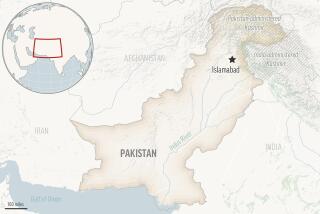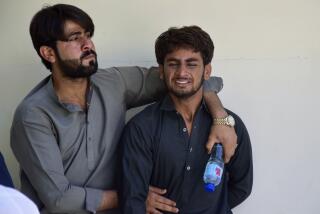Crisis Fuels Dreams That Could Unravel Pakistan
- Share via
QUETTA, Pakistan — Before war came, when times were good in Afghanistan, Abdul Hamid was a tailor in the capital, Kabul, crafting suits for foreigners, including an American he remembers now only as “Mr. John.”
But 22 years of conflict have left Hamid a near-permanent refugee here in neighboring Pakistan. He is the patriarch of a growing extended family that has fled turmoil at home for the safety and squalor of a tiny courtyard squeezed between the dusty, narrow alleys of Quetta’s Pushtun quarter.
Last week, Hamid’s family, already 10 strong, grew by two more with the arrival of a nephew, 21-year-old Sher Ahmed, and his wife, Bibi Qariya, who fled the southeastern Afghan city of Kandahar in panic at the prospect of an American military attack.
Hamid’s saga and thousands like it over the years have strained the social fabric in this remote but strategically vital part of the world, feeding long-simmering ethnic resentments that have plagued Pakistan since its inception.
As the United States zeros in on Afghanistan as a den of international terrorism, the impact of fast-unfolding events on the stability of its rediscovered ally is readily apparent here amid the stark, barren mountains of Baluchistan province.
The global terrorism crisis has refueled dreams of greater autonomy among two of Pakistan’s largest minorities, the Baluchis and the Pushtuns. And those dreams contain the seeds of trouble for Pakistan’s very existence as a unified nation.
Worries about Pakistan’s viability are nothing new. They have been around since it was carved out of British India as an independent state more than half a century ago with a diverse population bound together by the common thread of religion--Islam. In the current crisis, it is extreme voices from the mosques that lead a chorus of vitriol against the country’s leaders.
Pakistan has already split up once: It lost its eastern region in 1971 during the short, bitter war of independence waged by its Bengali population that gave birth to Bangladesh.
That war left Pakistan a collection of ethnic minorities chafing under the dominance of those from the rich and fertile Punjab region. Years of military rule punctuated by corrupt, out-of-touch civilian governments and the social upheaval in neighboring Afghanistan have merely added to the discontent of these minorities.
Now the war on international terrorism is stoking old tensions. A dizzying reversal of global loyalties has transformed Pakistan from sanctioned outcast to America’s crucial regional ally, placing its military government at odds with the strong anti-American mood of its people--all at a time of newly awakened minority aspirations.
In Baluchistan, political leaders of the two largest ethnic groups exude a contempt for federal authority, and they talk with growing urgency of gaining their own autonomous regions--albeit within the framework of Pakistan.
“There is prosperity in Punjab, but here in Baluchistan, there is no prosperity, no progress, no education and no industry,” said Sarwar Kakar, a Pushtun and the former speaker of Baluchistan’s provincial assembly. “Our people are so poor. . . . Right now, they are in the Stone Age.”
For Pushtuns, the arrival of Hamid, his family and an estimated 3.5 million mainly Pushtun refugees from Afghanistan over the last two decades has boosted long-held aspirations for a greater say in their own affairs.
Although Pakistan has officially closed its borders to Afghan refugees, many find their way through rugged unguarded passes to relatives in Quetta. Peter Kessler, a spokesman for the Office of the U.N. High Commissioner for Refugees, told reporters Friday in the capital, Islamabad, of a local man housing 25 newly arrived refugees. Another, he said, is sheltering 16.
“Most are women and children,” he said. “The men have stayed behind to watch over the families’ property.”
Members of the nationalist Pushtun Motherland Party talk of a Pushtun autonomous region carved out of three of Pakistan’s four provinces in addition to tribal areas along the frontier with Afghanistan.
They say the region would include Pakistan’s North-West Frontier province, where Pushtuns already are a majority. Although the party managed to seat just two members in Baluchistan’s 41-member provincial assembly during the last civilian government, party members are confident that events--and sentiments--are moving in their direction.
“We want to unite these parts of the country into a single Pushtun province,” said Manaf Dotani, a party activist. “We want our own assembly, which should be autonomous within the framework of Pakistan.”
But the increasing number of Pushtuns in Baluchistan has alarmed the leaders of the province’s indigenous Baluchi population. Their own desires for greater political power have increased as they have found themselves becoming a minority in their own province and have been watching their capital, Quetta, fast becoming an Afghan city.
With barely 4% of Pakistan’s population of 141 million inhabiting an area covering two-thirds of the country’s landmass, the ethnic balance is easily tipped.
Baluchi political figures talk of a demographic conspiracy to sabotage their dreams of an autonomous province, free of Islamabad’s control on all issues but currency and foreign policy.
Relations between the two ethnic groups have deteriorated in recent years as they have jostled for the meager political spoils in the province. Among the clutter that covers the desk of prominent Baluchistan National Party leader Habib Jalib are sheaves of legal challenges to what he regards as the illegal addition of Afghan refugees to local voting rolls.
But the suspicion that divides the two groups shrinks in comparison to their shared rejection of federal authority in Islamabad, an authority they see as dominated by the majority Punjabis.
“They took us all as their colonials,” said Abdur Rahim Mandokhel, the Pushtun Motherland Party’s deputy leader. “Pakistan was and is a Punjabi colonial state.”
Using more passionate, strident language, Jalib made the same point during a late-evening interview last week at his home near Quetta. He sketched a contrast between what he sees as Baluchistan’s great potential, its rich mineral resources and long coastline, and the stunted development that has left it the poorest of Pakistan’s four provinces. The blame, he said, rests with Islamabad.
“Politically, we’re a colony,” Jalib said. “Our situation is worse than East Timor [the former Portuguese colony that Indonesia invaded in 1975 and annexed in 1976]. We have the right to have our colonial question on the international agenda, and we will use all means of struggle but terrorism to break this chain.”
Creation of the autonomous Baluchistan envisioned by Jalib would mean taking land from the three other provinces, including Punjab, where large Baluchi communities now live. Although his ideas might seem radical, Jalib’s Baluchistan National Party had roughly a quarter of the seats in the last provincial government. Jalib himself was the floor leader of his party’s delegation to the federal parliament before Gen. Pervez Musharraf seized power in a 1999 coup.
Three years ago, Pushtun and Baluchi political groups here joined forces, forming an organization called the Pakistan Oppressed Nations Movement as a way to strengthen their political muscle against Islamabad. Pushtun deputy leader Mandokhel notes that, in addition to their struggle for greater autonomy, both parties have long opposed both the Taliban government in Afghanistan and the work of Osama bin Laden.
“As far as Osama is concerned, Baluchis and Pushtuns have a common cause in stopping the murderous government in Afghanistan,” Mandokhel said.
As the shock waves of the Sept. 11 terrorist attacks on the United States continue to roll through southwestern Asia, the extent of their impact remains unclear. But political figures in Baluchistan agree that conditions have suddenly become more fluid.
“It’s a very critical situation,” said Kakar, the former assembly speaker. “There’s no law, no justice, no prosperity. It’s a situation that breeds extremists.”
Although more than two decades of war have loosened Afghan refugees’ ties to their homeland, the links haven’t broken completely. Serving the extended family around him, Hamid admitted that he is worried about the future and the new clouds of war he sees. But he also allowed himself to ponder his actions if, by some miracle, peace should one day come again to his star-crossed land.
He didn’t hesitate.
“If there is peace,” he said, “we’ll all go.”
More to Read
Sign up for Essential California
The most important California stories and recommendations in your inbox every morning.
You may occasionally receive promotional content from the Los Angeles Times.













